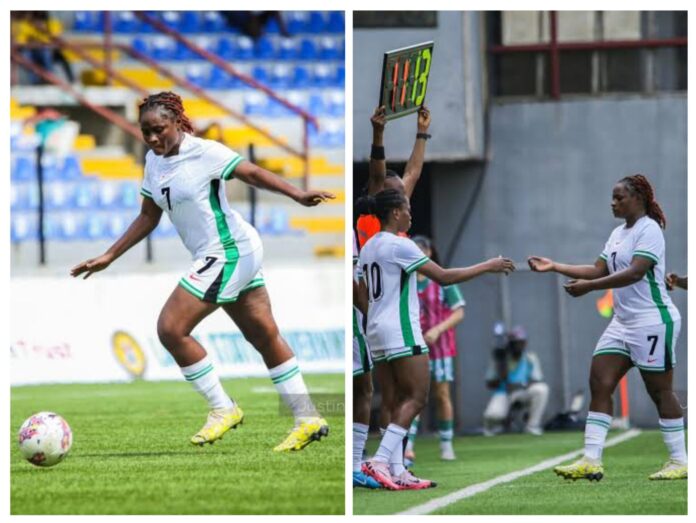The Untapped Goldmine: Why Nigeria’s Women’s Football League Deserves More Recognition and Investment
By Tolulope Oguntimehin
This morning, while scrolling through social media, I stumbled upon a short clip of Shukurat Oladapo, who recently signed for AS Roma Ladies, during her first training session with the team. Her excitement and determination to secure a spot in their league matches were palpable. Yet, what struck me most was the stark contrast between her new journey and the lack of recognition Nigeria’s Women’s Football League receives back home. Despite producing world-class talents like Oladapo, the league continues to operate in the shadows, overshadowed by other leagues in Europe
Shukurat Oladapo is just one of many Nigerian female players who have left the shores of Nigeria to join top European and American clubs. Unlike their male counterparts, who often start in academy or youth teams, these women walk straight into the main teams of their new clubs. This speaks volumes about the quality and readiness of players from Nigeria’s Women’s Football League. Yet, despite this undeniable talent, the league remains underfunded, underpromoted, and undervalued.
At one point, Nigerians expressed concerns about the drop in performance of female players who moved abroad, arguing that they performed better for the national team when they stayed in Nigeria. Our female players excel both at home and abroad, proving that the issue isn’t talent but rather the lack of exposure, branding, and merchandising opportunities in Nigeria. Why is it so difficult to replicate the level of support and recognition that European leagues provide? If there’s one area where Nigeria is close to matching Europe, it’s women’s football. So, why aren’t we taking it seriously?
During a press conference, the chairperson of the Women’s Football League was asked about sponsorship for the league. Her response? “we want to focus more on partnership than sponsorship.” Unfortunately, these partnerships have been few and far between. Who should be partnering with the women’s league? Who are the stakeholders that can drive this change? In Europe and America, women’s football thrives because of strong corporate partnerships, government investment, and a focus on branding and merchandising. Nigeria must adopt a similar approach.
The league must prioritize building robust structures that make investment not only possible but attractive, drawing lessons from the frameworks already established for men’s football. By doing so, it can create a sustainable ecosystem for women’s football to thrive. One key step is encouraging established clubs like Sporting Lagos, Ikorodu City, and Inter Lagos to expand their portfolios by owning and managing female teams just as the management of Remo stars is doing with their female team. This move would not only bridge the gap between European clubs and Nigerian women football clubs but also bring much-needed resources, expertise, and visibility to the women’s game.
Branding, merchandising, and publicity are critical areas that require immediate attention. The league must work tirelessly to create a compelling narrative around women’s football, one that resonates with fans and sponsors alike. From designing eye-catching merchandise to launching targeted marketing campaigns, every effort should be made to attract fans to the stadiums. Imagine the impact of seeing female football stars on billboards, social media, and TV ads, or the excitement of fans wearing jerseys with the names of their favorite female players. These are not just dreams—they are achievable goals that can transform the league into a vibrant, fan-driven spectacle.
The federal government must commit to developing women’s football as part of President Bola Ahmed Tinubu’s agenda to empower the youth. The Women’s Football League must also take proactive steps by encouraging private individuals and groups to own women’s clubs, as seen in the United States and other parts of the world.
Recently, players like Josephine Mathias and Rivers Angels’ goalkeeper Fatima Oloko captured the attention of Nigerians, but these moments of media buzz were not maximized. The league must learn to capitalize on such opportunities to build a sustainable fan base and attract sponsors. Women’s football is a goldmine waiting to be tapped, but it requires a strategic, intentional approach.
The National Sports Commission must push the federal government to allocate special funds for the development of women’s football. The league must also rethink its strategies, focusing on better packaging, promotion, and partnerships. Our women’s football isn’t lacking in quality—it’s lacking in the right structures and support systems.
It’s time for Nigeria to give its Women’s Football League the attention it deserves. With the right investment, branding, and government backing, the league can become a powerhouse, not just in Africa but on the global stage. The talent is there; now, it’s up to us to unlock its full potential.












